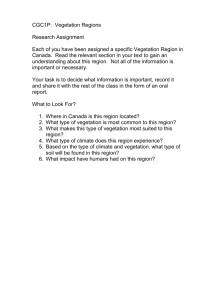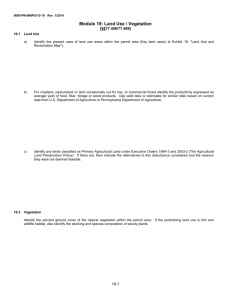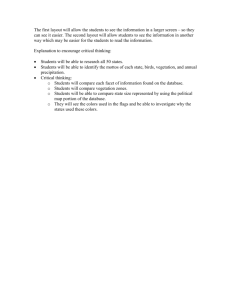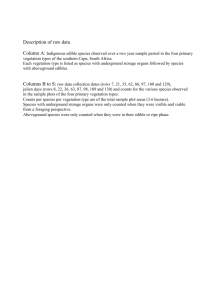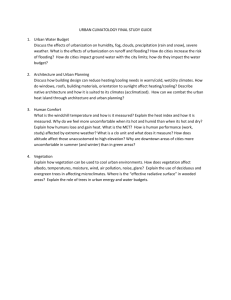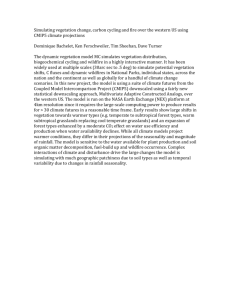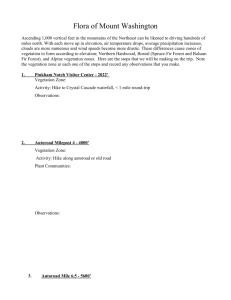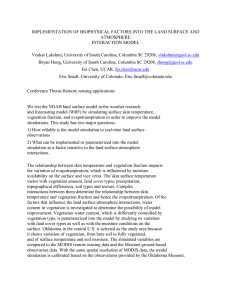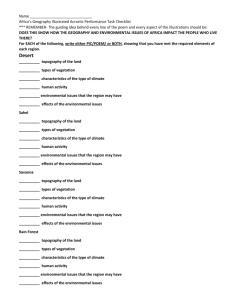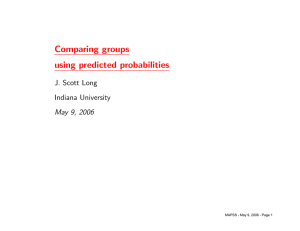Vegetation Distribution and Climate Change in the West Ronald P. Neilson
advertisement
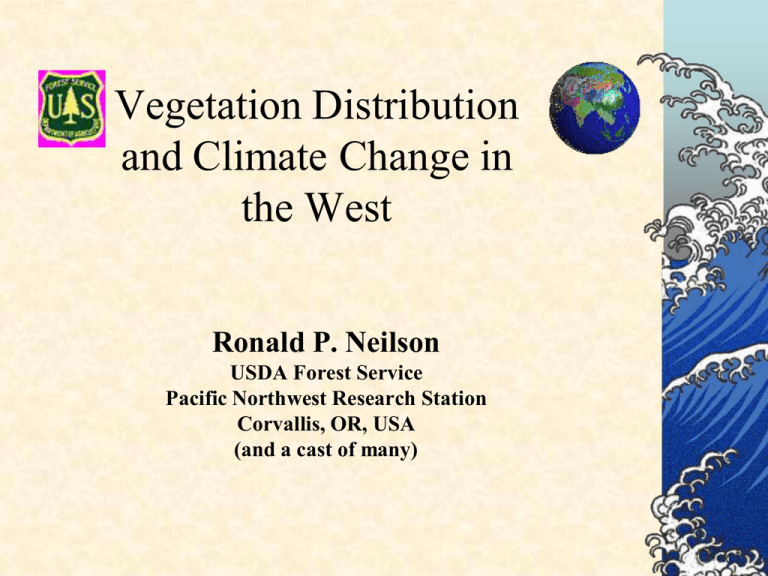
Vegetation Distribution and Climate Change in the West Ronald P. Neilson USDA Forest Service Pacific Northwest Research Station Corvallis, OR, USA (and a cast of many) Challenges for Restoration Under Rapid Climate Change • Function – Services? – Wetter or Drier? • • • • Woody Expansion? Dieback? Infestation Loss of Water Resources • Diversity – Services? – A Superstructure to maintain Function – Functional Types – Functional Groups – Species and Community Assembly Rules – Migration • Invasion • Establishment 1988-89 1940-47 1972-77 Ocean-Climate Regime Shifts Source: OSTP Variations of the Earth’s Surface Temperature: 1000 to 2100 Similar to Glacial – Interglacial Temperature Change High Warming Moderate Warming Small Warming • 1000 to 1861, N. Hemisphere, proxy data; • 1861 to 2000 Global, Instrumental; • 2000 to 2100, SRES projections Climate Scenario Uncertainties Model Uncertainty versus Emissions Uncertainty (IPCC – Fourth Assessment Report Scenarios) Change in Mean Monthly Temperature (Degrees C) 2070-2099 vs 1961-1990 A2 MIROC HAD CSIRO A1B B1 Regional Precipitation Uncertainty: North Wetter, South Drier Percent Change in Precipitation 2070-2099 vs 1961-1990 A2 MIROC HAD CSIRO A1B B1 Long-Term Changes in Distribution and Structure Major Biome Boundaries Ecotones in Space – Ecotones in Time (Threshold, Tipping Point) Communities and Ecosystems: MacMillan RH Whittaker - New York, 1975 Water Limited Leaf Area Carrying Capacity All else follows! Current Climate Thermal Zones MAPSS Simulations Boreal Temperate Future Thermal Impacts • Longer Growing Season • Migration • Natives Invade Natives • Release of Frost Limitations • Loss of Alpine • Expansion of Subtropics • Great Basin Thresholds • Expansion of Tropics Subtropical Tropical GFDL Future Climate MAPSS Simulated Vegetation Distribution Ecotones in Space Emergent Properties LAI, Ecotones, Runoff Water Limited Leaf Area Carrying Capacity All else follows! To my Knowledge Only three Process-based Biogeography Models Published! DGVM (Full Structure) MAPSS MC1, BIOMAP DOLY SDGVM BIOME LPJ Neilson,R.P. 1995. A model for predicting continental-scale vegetation distribution and water balance. Ecological Applications 5:362-385. Woodland Expansion MAPSS Simulation Current Climate Future Climate (CGCM1) Forest (Green) Woodland Savanna (Brown) Grassland Shrubland Desert Future Woody and Grass Expansion in the West Enhance Carbon Storage, and Catastrophic Wildfire, But… Bachelet,D., R.P.Neilson, J.M.Lenihan, and R.J.Drapek. 2001. Climate change effects on vegetation distribution and carbon budget in the U.S. Ecosystems 4:164-185. Natives Invading Natives MAPSS Simulation Current Climate Future Climate (CGCM1) Explosive Great Basin Diversity Bachelet,D., R.P.Neilson, J.M.Lenihan, and R.J.Drapek. 2001. Climate change effects on vegetation distribution and carbon budget in the U.S. Ecosystems 4:164-185. MC1 Simulate Historical Vegetation Distribution Mode Vegetation Type (1961 -1990) MC1 Simulate Future Vegetation Distribution Mode Vegetation Type CSIRO_a2 MC1 Simulate Future Vegetation Distribution Mode Vegetation Type HADLEY_a2 MC1 Simulate Future Vegetation Distribution Mode Vegetation Type MIROC_a2 Vegetation Carbon (Percent Change) CSIRO_a2 Vegetation Carbon (Percent Change) HADCM3_a2 Vegetation Carbon (Percent Change) MIROC_a2 Biomass Consumed by Fire (Percent Change) CSIRO_a2 Biomass Consumed by Fire (Percent Change) HADCM3_a2 Biomass Consumed by Fire (Percent Change) MIROC_a2 Near -Term Changes in Variability and Disturbance Some areas are projected to become wetter, others drier with an overall increase projected Annual mean precipitation change: 2071 to 2100 Relative to 1990 August 6, 2008 The Water Cycle moves most of the energy from the Tropics to the Poles! September 14, 2008 The Water Cycle moves most of the energy from the Tropics to the Poles! June 4, 2009 The Water Cycle moves most of the energy from the Tropics to the Poles! June 6, 2009 The Water Cycle moves most of the energy from the Tropics to the Poles! July 12, 2009 The Water Cycle moves most of the energy from the Tropics to the Poles! Drought and Fire in the West (Simulated Fire, no Fire Suppression) -4 60 50 -2 PDSI 40 0 30 20 Wet 2 10 4 0 1900 1910 1920 1930 1940 1950 Palmer Drought Severity Index (5 year running average) 1960 1970 1980 1983 Simulated Area Burned (MC1 Model) (5 year running average) Spearman Rank Correlation Coefficient -0.59*** 1990 Simulated Area Burned (millions of acres) Dry Western Regions 2000 1998 El Niño The MAPSS Team, unpublished Precipitation (Red Transect) Moisture Zones Global Cooling Global Warming Wet vs. Dry Winter Global Warming Global Cooling Polar Front Tentative Changes Arizona Monsoon (July – August Summer Humidity Gradient • Winter Cyclonic Storms • Wetter North, Drier South • Seasonality Shifts •Expansion of Arizona Monsoon Mitchell,V.L. 1976. Journal of Applied Meteorology 15:920-927. Neilson & Wullstein. 1983. Journal of Biogeography 10:275-297. Variation in Leaf Carbon (g/m2) OR / WA / ID (SRES A2 Scenarios) 200 150 100 50 0 -50 4K-hist 8K-hist 8K-Miroc 8K-Had 8K-CSIRO 2100 2090 2080 2070 2060 2050 2040 2030 2020 2010 2000 1990 1980 1970 1960 1950 1940 1930 1920 1910 1900 1890 -100 Variation in Leaf Carbon (g/m2) CA / NV / UT (SRES A2 Scenarios) 50 25 0 4K-hist 8K-hist 8K-Miroc 8K-Had 8K-CSIRO 2100 2090 2080 2070 2060 2050 2040 2030 2020 2010 2000 1990 1980 1970 1960 1950 1940 1930 1920 1910 1900 1890 -25 Variation in Leaf Carbon (g/m2) AZ / NM / CO (SRES A2 Scenarios) 50 25 0 4K-hist 8K-hist 8K-Miroc 8K-Had 8K-CSIRO 2100 2090 2080 2070 2060 2050 2040 2030 2020 2010 2000 1990 1980 1970 1960 1950 1940 1930 1920 1910 1900 1890 -25 Summary • Warmer temperatures will push alpine and subalpine communities off the tops of the mountains • Wetter winters in the north, drier in the south with great uncertainty and variability inbetween • The Arizona Monsoon will very likely be enhanced, although the GCMs are very weak in simulating this • Thus, lower elevational forest ecotones could go down at southern latitudes (within the Monsoon region), even while deserts could become hotter and either more or less xeric. • Huge Uncertainties: – CO2 effect on enhanced woody expansion. – Near-Term Variability, Establishment and Disturbance Management Implications (personal musings) • Management Goals face an uncertain Future – The Future will NOT echo the Past • Instead,… Manage Change, per se – Desired function may supercede ‘Desired future condition’ • Improve resilience of ecosystems to rapid change, e.g. – Keep forest density below water-limited carrying capacity – Plant diversity rather than homogeneous monocultures • Restoration efforts confront: – a) establishment bottlenecks, – b) invasions, – c) functional communities Acknowledgements Pacific Northwest Research Station Managing Disturbance Regimes Program Oregon State University Colorado State University University of Montana National Center for Atmospheric Research IRI, International Research Institute for Climate Prediction CEFA/DRI Program for Climate, Ecosystem And Fire Applications National Fire Plan USFS Climate Change Program NSF, EPA, DOE, EPRI, USGS-BRD Variation in Leaf Carbon (g/m2) Western States (SRES A2 Scenarios) 100 75 50 25 0 4K-hist 8K-hist 8K-Miroc 8K-Had 8K-CSIRO 2100 2090 2080 2070 2060 2050 2040 2030 2020 2010 2000 1990 1980 1970 1960 1950 1940 1930 1920 1910 1900 1890 -25
